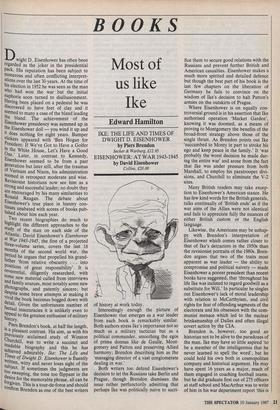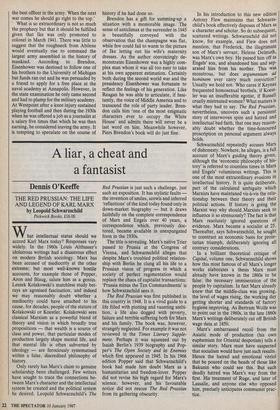BOOKS
Most of us like Ike
Edward Hamilton
IKE: THE LIFE AND TIMES OF DWIGHT D. EISENHOWER by Piers Brendon
Secker & Warburg, £12.95
EISENHOWER: AT WAR 1943-1945 by David Eisenhower
Collins, £20.00
Dwight D. Eisenhower has often been regarded as the joker in the presidential Pack. His reputation has been subject to numerous and often conflicting interpret- ations over the last 30 years. At the time of his election in 1952 he was seen as the man Who had won the war but the initial euphoria soon turned to disillusionment. Having been placed on a pedestal he was discovered to have feet of clay and it seemed to many a case of the bland leading the bland. The achievement of the Eisenhower presidency was summed up in the Eisenhower doll — you wind it up and it . does nothing for eight years. Bumper stickers appeared with 'Ben Hogan for President: If We've Got to Have a Golfer M the White House, Let's Have a Good One.' Later, in contrast to Kennedy, Eisenhower seemed to be from a past generation but later still, after the traumas of Vietnam and Nixon, his administration seemed in retrospect moderate and wise. Revisionist historians now see him as a strong and successful leader; no doubt they are encouraged by his many similarities to Ronald Reagan. The debate about Eisenhower's true place in history con- tinues unabated with scores of books pub- lished about him each year. . Two recent biographies do much to highlight the different approaches to the study of the man on each side of the Atlantic. David Eisenhower's Eisenhower at War 1943-1945, the first of a projected three-volume series, covers the last 18 months of the second world war, the period he argues that propelled his grand- father 'from relative obscurity . . . into Positions of great responsibility'. It is reverential, diligently researched, with some new material culled from interviews and family sources, most notably some new Photographs, and patently sincere; but despite some brave attempts 'at making it vivid the book becomes bogged down with detail. Given the unfortunate number of factual inaccuracies it is unlikely even to appeal to the greatest enthusiast of military history. . Piers Brendon's book, at half the length, is a pleasant contrast. His aim, as with his previously acclaimed study of Winston Churchill, was to write a succinct and readable biography and this he has ac.hieved admirably. Ike: The Life and TIM. es of Dwight D. Eisenhower is fluently wntten, witty and never loses sight of the subject. If sometimes the judgments are too. sweeping, the tone too flippant in the desire for the memorable phrase, all can be forgiven. This is a tour-de-force and should confirm Brendon as one of the best writers
of history at work today. Interestingly enough the picture of Eisenhower that emerges as a war leader from each book is remarkably similar. Both authors stress Ike's importance not so much as a military tactician but as a political commander, smoothing the egos of prima donnas like de Gaulle, Mont- gomery and Patton and preserving Allied harmony; Brendon describing him as the 'managing director of a vast conglomerate dealing in war.'
Both writers too defend Eisenhower's decision to let the Russians take Berlin and Prague, though Brendon dismisses the issue rather perfunctorily admitting that perhaps Ike was politically naive to sacri- fice them to secure good relations with the Russians and prevent further British and American casualties. Eisenhower makes a much more spirited and detailed defence but though the best part of his book is the last few chapters on the liberation of Germany he fails to convince on the wisdom of Ike's decision to halt Patton's armies on the outskirts of Prague.
Where Eisenhower is on equally con- troversial ground is in his assertion that Ike authorised operation `Market Garden', knowing it was doomed, as a means of proving to Montgomery the benefits of the broad-front strategy above those of the single thrust. As Brendon points out Ike `succumbed to Monty in part to stroke his ego and keep peace in the family.' It 'was probably the worst decision he made dur- ing the entire war' and arose from the fact that Ike was under pressure from both Marshall, to employ his paratrooper divi- sions, and Churchill to eliminate the V-2 sites.
Many British readers may take excep- tion to Eisenhower's American stance. He has few kind words for the British generals, talks continually of 'British ends' as if the war aims of the Allies were not identical and fails to appreciate fully the nuances of either British custom or the English language.
Likewise, the Americans may be unhap- py with Brendon's interpretation of Eisenhower which comes rather closer to that of Ike's detractors in the 1950s than the revisionist portraits of the 1980s. Bren- don argues that two of the traits most apparent as war leader — the ability to compromise and political naivety — made Eisenhower a poorer president than recent books have suggested, that 'throughout his life Ike was inclined to regard goodwill as a substitute for Will.' In particular he singles out Eisenhower's lack of moral leadership with relation to McCarthyism, and civil rights for fear of offending segments of the electorate and his obsession with the com- munist menace which led to the nuclear brinksmanship of Dulles and often illegal covert action by the CIA.
Brendon is, however, too good an historian not to be alive to the paradoxes of the man. Ike may have so little aspired 'to be a member of the intelligentsia that he never learned to spell the word', but he could hold his own both in cosmopolitan company and historical argument. He may have spent 16 years as a major, much of them engaged in coaching football teams, but he did graduate first out of 275 officers at staff school and MacArthur was to write of him in his war department report 'this is the best officer in the army. When the next war comes he should go right to the top.'
What is so extraordinary is not so much the prophecy but that it should be fulfilled given that Ike was only promoted to colonel in March 1941. There was little to suggest that the roughneck from Abilene would eventually rise to command the largest army assembled in the history of mankind. According to Brendon, Eisenhower was destined to follow one of his brothers to the University of Michigan but funds ran out and he was persuaded by a friend to apply for a free place at the naval academy at Annapolis. However, in the state examination he only came second and had to plump for the military academy. At Westpoint after a knee injury sustained playing football and then during the 1930s when he was offered a job as a journalist at a salary five times that which he was then earning, he considered leaving the army. It is tempting to speculate on the course of history if he had done so.
Brendon has a gift for summing-up a situation with a memorable image. The sense of anticlimax at the surrender in 1945 is beautifully conveyed with the observation that the champagne was flat, while few could fail to warm to the picture of Ike letting out his wife's maternity dresses. As the author convincingly de- monstrates Eisenhower was a highly com- plex man whom it was all too easy to take at his own apparent estimation. Certainly both during the second world war and the presidency Eisenhower was fortunate to reflect the feelings of his generation. Like Reagan he was able to articulate, if hesi- tantly, the voice of Middle America and to transcend the role of party leader. Bren- don calls him 'one of the most enigmatic characters ever to occupy the White House' and admits there will never be a last word on him. Meanwhile however, Piers Brendon's book will do just fine.











































 Previous page
Previous page